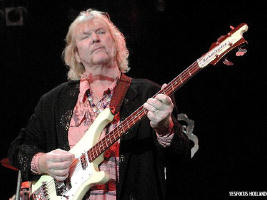IS PROG ROCK ON THE ROCKS?
by GUY SADDY
 Guy
Saddy’s writing has appeared in Equinox, Saturday Night,
Elle (Canada), Jazziz, Flare, TV Guide, Chatelaine, among
other publications. In the 1990s, he wrote a men's fashion column
for the Vancouver Sun, was a Contributing Editor for
TV Guide (Canada) and did a one-season stint as Producer
on CTV’s Vicki Gabereau show. Currently, he writes regular
columns for Elle (Canada), and Saturday Night.
Guy
Saddy’s writing has appeared in Equinox, Saturday Night,
Elle (Canada), Jazziz, Flare, TV Guide, Chatelaine, among
other publications. In the 1990s, he wrote a men's fashion column
for the Vancouver Sun, was a Contributing Editor for
TV Guide (Canada) and did a one-season stint as Producer
on CTV’s Vicki Gabereau show. Currently, he writes regular
columns for Elle (Canada), and Saturday Night.
In and around
the lake
Mountains come out of the sky
And they stand there. . .
— from Roundabout (Fragile, 1972)
Er .
. . yes. Or more accurately Yes, the band responsible for the
above lyrical jewel, and for a oeuvre that can be charitably described
as “over-the-top," less charitably as "self-indulgent
crap." But back when purple microdot was a cultural touchstone,
Yes and their Progressive Rock contemporaries -- Genesis, King
Crimson, Jethro Tull and Emerson, Lake & Palmer, to name a
few -- strode the earth like the dinosaurs to which they would
inevitably be compared. Like those great beasts, their time was
also cut short -- mercifully so if you, like most, soon grew tired
of Mellotrons and Minimoogs, of caped keyboardists and their symphonic
pretensions, of “concept albums” featuring obscure
themes and 20-minute songs. Of excess masquerading as excellence.
 By
the end of the 1970s, “Prog" -- for simplicity's sake,
let's call it the shotgun marriage of classical to rock -- seemed
pretty much over, scrubbed from the charts by the rise of Punk
and Disco, and by the Proggers themselves who, suicidally, continued
to ratchet up their own bloat. In the end, Prog seemed fated to
be remembered as a lesson in what can happen when musical expertise
trumps artistic judgment. There would be no ironic renaissance.
It was, music critics gleefully pronounced, a dead genre.
By
the end of the 1970s, “Prog" -- for simplicity's sake,
let's call it the shotgun marriage of classical to rock -- seemed
pretty much over, scrubbed from the charts by the rise of Punk
and Disco, and by the Proggers themselves who, suicidally, continued
to ratchet up their own bloat. In the end, Prog seemed fated to
be remembered as a lesson in what can happen when musical expertise
trumps artistic judgment. There would be no ironic renaissance.
It was, music critics gleefully pronounced, a dead genre.
But
wait. Yes has been touring again, filling auditoriums with fans
drawn to the band's uniquely abstruse world view. Last December,
Jethro Tull released a Christmas album and Rolling Stone
magazine 'liked it.' In their January issue, Spin featured an
essential Prog album list -- served straight-up, without the expected
sneering, ironic chaser. Last season on Sex and the City,
the highly fashionable Carrie Bradshaw was seen wearing a highly
unfashionable Yes tee shirt! On a recent Saturday Night Live
appearance, Jack Black did a prog sendup that was pure homage.
In this strange, alternate universe, what was next? The redemption
of Richard Nixon?
And
yet was Prog really so bad? Much was, certainly, and its most
egregious trespasses still provoke disbelief, if not cramps. (Frenetic
flautists! Arthurian legends! Glockenspiels! Emerson, Lake &
Palmer!) Some of it, however, was truly sublime. The ethereal
beauty of Yes vocalist Jon Anderson's pipes at full throttle,
an otherworldly timbre that inspires chills. Or the swirling,
contrapuntal elegance that typified Genesis, before the departure
of their brilliant front man, Peter Gabriel. Fans of the genre
marveled at complex rhythms so tautly woven you hardly noticed
the shifting beat, and at musical chops that, for the first time,
put rock players on par with classical musicians and bebop jazzers.
The lyrics? Well, Stravinsky wasn't Dylan, either.
Prog
stretched the three chord boundaries of rock forever, and years
after the genre flat lined, its echoes could still be heard in
the works of anyone from Rush, Styx and Kansas, to Kate Bush,
Tori Amos and, of course, Peter Gabriel. Lately, a new slate of
bands have picked up the, um, Progressive lance. Today, contemporary
Prog is championed by groups like Dream Theater, Sigur Rios, Godspeed
You! Black Emperor, Elbow, Spock's Beard, Mars Volta -- and, most
conspicuously, Radiohead, whose recent Prog toe-dipping introduced
a whole new Britpop demographic to the genre's pioneers. And to
capes.
 For
some, these developments bode no joy. It's true the lesser entries
in the Prog canon illustrate the fine line between “reaching”
and “overreaching,” a line that, when crossed, rarely
results in much good. But ultimately, the impulse that lies at
Prog's polyrhythmic heart is what propels other impossibly ambitious
endeavors: the soaring libretto, the Homeric journey, the erection
of unthinkably tall buildings. By attempting epic works, we strive
toreflect
the epic nature of the human experience. And if Prog occasionally
fell short, well, at times, so do we all.
For
some, these developments bode no joy. It's true the lesser entries
in the Prog canon illustrate the fine line between “reaching”
and “overreaching,” a line that, when crossed, rarely
results in much good. But ultimately, the impulse that lies at
Prog's polyrhythmic heart is what propels other impossibly ambitious
endeavors: the soaring libretto, the Homeric journey, the erection
of unthinkably tall buildings. By attempting epic works, we strive
toreflect
the epic nature of the human experience. And if Prog occasionally
fell short, well, at times, so do we all.
A bit
over-the-top, I suppose. But so was Prog. At its best, however,
it had the power to inspire awe. Still does. Mountains come out
of the sky. And they stand there.